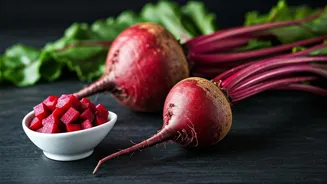Nutrient-Rich Powerhouse
Beetroot is a nutritional treasure trove, packed with essential vitamins and minerals that support overall health. It's an excellent source of folate (vitamin
B9), crucial for cell growth and function. Beetroot also contains manganese, contributing to bone health, and potassium, which is vital for blood pressure regulation. Moreover, it is loaded with vitamin C, acting as an antioxidant and supporting the immune system. The presence of dietary fiber aids digestion and promotes gut health. These nutrients work synergistically to offer a range of health benefits, making beetroot a valuable addition to a balanced diet. It's important to incorporate it in your diet for its various health benefits.
Heart Health Booster
Beetroot can significantly benefit heart health due to its high nitrate content. Nitrates are converted into nitric oxide in the body, which helps relax and widen blood vessels. This vasodilation leads to reduced blood pressure, decreasing the strain on the heart and reducing the risk of cardiovascular diseases. Studies have shown that regular beetroot consumption can lower both systolic and diastolic blood pressure levels. Additionally, beetroot contains antioxidants that combat oxidative stress and inflammation, two factors contributing to heart disease. Beetroot's ability to improve blood flow and reduce inflammation makes it a heart-healthy choice.
Enhancing Athletic Performance
For athletes, beetroot can be a performance enhancer. The nitrates in beetroot increase the efficiency of mitochondria, the energy-producing units in cells. This improved efficiency means muscles can work harder and longer before fatigue sets in. Studies have shown that beetroot juice consumption before exercise can improve endurance and reduce the oxygen cost of exercise. Athletes often use beetroot to enhance stamina, reduce muscle soreness, and speed up recovery. The benefits are noticeable in various sports, from running and cycling to swimming, making beetroot a natural performance-enhancing supplement.
Supporting Brain Health
Beetroot can also play a role in maintaining and improving brain health, especially as we age. The increased blood flow caused by beetroot's nitrates can improve oxygen delivery to the brain. This is particularly beneficial because it may improve cognitive function and slow cognitive decline. Beetroot's antioxidant properties also protect brain cells from damage caused by free radicals. Regular consumption might enhance memory and cognitive function. Including beetroot in your diet can be a proactive step in maintaining a healthy brain and potentially reducing the risk of age-related cognitive decline. It is an essential part of health and well-being.
Detoxification Support
Beetroot aids the body's natural detoxification processes. It contains betalains, which are powerful antioxidants and anti-inflammatory compounds. These compounds help support the liver's detoxification pathways, assisting in removing harmful toxins from the body. Beetroot stimulates the liver to produce more glutathione, a critical antioxidant that neutralizes free radicals. Regular consumption might help protect the liver from damage and improve its overall function. Incorporating beetroot can support the body's natural detoxification processes and promote better overall health.
Diabetes Management Benefits
Beetroot can be a beneficial addition to a diet for those managing diabetes. Beetroot has a relatively low glycemic index (GI), which means it causes a slower and steadier rise in blood sugar levels after consumption. This helps prevent blood sugar spikes, which is crucial for diabetic individuals. The fiber content in beetroot also contributes to blood sugar control by slowing down glucose absorption. Additionally, some studies suggest that the antioxidants in beetroot can improve insulin sensitivity. Eating beetroot, in moderation and as part of a balanced diet, can support blood sugar management and overall metabolic health.
Kidney-Safe Eating Tips
Beetroot contains oxalates, which can contribute to kidney stone formation in some individuals. It is vital to consume beetroot safely to prevent this. If you are prone to kidney stones, it's best to eat beetroot in moderation and consider cooking methods that reduce oxalate content. Cooking beetroot reduces oxalate levels. Furthermore, hydrating well can help flush out oxalates and prevent their accumulation in the kidneys. It is recommended to consult a healthcare provider or a registered dietitian for personalized dietary advice, especially if you have a history of kidney stones or kidney issues. These steps ensure you can enjoy beetroot's benefits without jeopardizing your kidney health.
Preparation Methods
Several cooking methods can minimize oxalate content and make beetroot a kidney-friendly option. Roasting beetroot is a popular method that enhances its natural sweetness and reduces oxalates. Boiling beetroot can also help leach out oxalates; discard the cooking water to further reduce oxalate intake. Pickling beetroot is another option, as the vinegar can help in the reduction of oxalates. Always peel beetroot before cooking, as the skin contains higher oxalate levels. For a kidney-safe approach, moderate portion sizes and combine beetroot with other low-oxalate foods. These preparation tips help you enjoy beetroot safely.
Kidney-Friendly Recipes
Several recipes can help you incorporate beetroot into your diet while safeguarding kidney health. A roasted beetroot salad with kidney-friendly vegetables, such as cucumbers and bell peppers, is a refreshing option. You can also blend cooked beetroot into smoothies with low-oxalate fruits and vegetables. Preparing beetroot in a stew or curry with other kidney-friendly ingredients like cauliflower and zucchini is a good choice. Avoid adding high-sodium ingredients or excessive amounts of spices. Always monitor portion sizes and consider using herbs and spices to add flavor without increasing oxalate intake. These kidney-friendly recipes will help you enjoy the benefits of beetroot while minimizing potential risks.
Final Thoughts
Beetroot provides an impressive range of health benefits, from improving heart health to enhancing athletic performance. By understanding its nutritional profile and the impact of oxalates, you can consume beetroot safely, especially if you're mindful of your kidney health. Incorporating beetroot into your diet is an excellent way to promote overall wellness. By following the tips and recipes discussed, you can enjoy the vibrant flavor and numerous health benefits that beetroot has to offer. Remember to consult a healthcare professional or a registered dietitian for tailored dietary advice. This will ensure you enjoy the benefits of beetroot while maintaining optimal health.


















